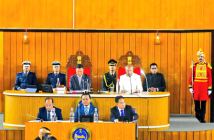Inflation Pushes Economy Towards Recession. Inflation has gone beyond energy and food commodity prices, and the lockdown in China is causing supply chain disruptions. Escalation in the Ukraine war is fueling the fire, forcing people to burn the midnight oil to squeeze cash flows to avoid defaults in the ever-increasing interest rates. Although the economic prudence prefers spending the money wisely rather than saving, the time for tightening individual purse strings has arrived. The economy is headed towards a hard landing.
Digging both feet in the water, the Central Banks use the interest rate- hike weapon to fight inflation andrising prices. The focus is to curb demand rather than improve the supply. The contest between the regulator and the inflation has brought the recession just a few doors away. Navigating the economy to safe shores is a new challenge.
Across the world, 75 million more people were pushed into extreme poverty by the pandemic in 2021. High food prices have affected the poor, especially in the Middle East, Asia and Africa, where food accounts for 40% of consumers’ spending. A worsening of the situation in Ukraine shoots up human and economic costs, while high inflation could inflame social tensions. The IMF downgraded forecasts for global growth in 2022 to 4.1% and then 3.6% after an estimated expansion of 6.1% in 2021. There is a vast moderation in India’s growth estimates, and the continuous downturn may result in unfavourable growth. Clouds are gathering over the economy.
The Ukraine conflict has already upset the global geo-economic balance. The war exacerbated tensions in a production system poorly damaged by two years of pandemics. The world economy faces stagflation. The response of the central banks has resurrected the fear of a recession, even in the advanced economy, “Global growth is likely to be lower than expected, while inflation is higher. We must also not forget that poverty and inequality are increasing,” said IMF’s DMD in the Review meeting in Morocco.
The economy watch platform Coface has revised the evaluation of 19 countries, including 16 in Europe, Germany, Spain, France and the United Kingdom. The 76 downward revisions of countries globally highlight the spread of successive economic shocks across sectors like petrochemicals, metallurgy, paper and construction. Although the economy does not grow by saving the coal but by using the time while it burns, the shortages are overpowering the horizon hazy. India can not rule out an adverse scenario due to dark clouds.
The slowdown and the risk of stagflation are more apparent. GDP globally grew very weakly due to a drop in household consumption against declining purchasing power. The foreign trade fell, and the difficulties in the manufacturing sector in replenishing inventories have prolonged. The picture does not look better in advanced economies. It is less favourable in emerging economies like India.
Although commodity prices have stabilised recently, they remain at very high levels. Oil prices have not fallen below $ 98 since the beginning of the war, and fears of a potential supply shortage remain significant. Industries with energy-intensive value chains, such as paper, chemicals and metals, have their risks reassessed upwards. Agri-food is facing the highest chase with almost all countries affected. The companies that had not fully passed on the increase in production costs to their sales prices will do so now to avoid losses. The price revision expected from the pharmaceutical industry, where a small number of companies dominate the global market, would hit the poor badly. Rising borrowing cost has affected employment in the housing and construction activity.
Global regulators have woken up to mitigate the challenge. RBI has increased interest rates and SLR, following the example of the ECB, Fed, the Bank of Canada and the Bank of England. More hikes may come. To curb inflation, the RBI seems tempted to push the economy into a recession temporarily. With the high-interest rates, the demand would fall, and inflation would moderate, which might turn milder if prices begin to slide. The decline in commodity prices, easing the supply shortages and strict control of fiscal measures for the next 18 months will disperse the clouds of depression from the global economy.
“ As sure as the spring will follow the winter, prosperity & economic growth will follow recession.”
– Hargovind Sachdev





